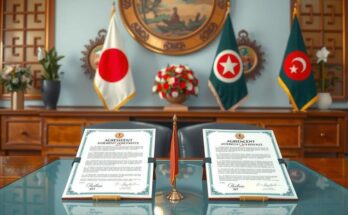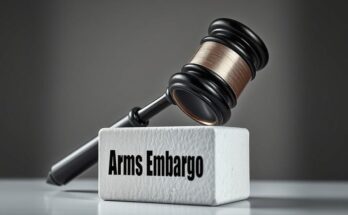Ethiopia’s Ministry of Foreign Affairs rejected Somalia’s accusations of an attack in Doolow, labeling them false and attributing the incident to destabilizing forces. Somalia had condemned the alleged Ethiopian aggression as a violation of the Ankara Declaration during ongoing peace efforts. Ethiopia reaffirmed its commitment to cooperation, emphasizing the importance of peace in the Horn of Africa while addressing the accusations coinciding with a recent diplomatic visit from Somalia.
Ethiopia’s Ministry of Foreign Affairs has firmly denied Somalia’s claims of Ethiopian attacks in Doolow, labeling the allegations as “not true” and asserting that they originate from “certain elements” who seek to disrupt the improving relations between the two nations. The Ministry issued this statement on December 24, attributing the Doolow incident to those who wish to destabilize the Horn of Africa and termed them “perennial spoilers of peace in the region.” Ethiopia emphasized that such destabilizing forces should not impede the commitment to peace expressed in the Ankara Declaration.
The Somali government had previously condemned what it described as an “unprovoked and unexpected attack” by Ethiopian forces on their military bases in Doolow, alleging that this aggression resulted in casualties among Somali troops. Somalia asserted that this action violated the Ankara Declaration and raised serious concerns given its timing amidst ongoing peace initiatives.
In its response, Ethiopia reiterated its commitment to work with Somalia’s federal government to prevent similar incidents in the future. They also conveyed their intention to strengthen the fraternal relations between the two neighbors, underscoring the importance of adhering to the Ankara Declaration, a key agreement aimed at fostering cooperation and peace in the region. Ethiopia mentioned that the accusations from Somalia coincided with a high-level diplomatic visit from Somalia aimed at reinforcing commitments under the same declaration.
Amidst reports of clashes involving Somali federal forces, Jubaland regional troops, and Ethiopian patrols, Somalia admonished against future breaches of its sovereignty, asserting its right to respond to such infringements. Ethiopia, on its part, recognized the resolve of both nations’ leaders to enhance bilateral relations and maintain stability in the Horn of Africa.
The recent tensions between Ethiopia and Somalia underscore a complex history of relations characterized by geopolitical interests and territorial disputes. The Ankara Declaration, which aims to promote peace and cooperation between the two nations, serves as a crucial framework for addressing underlying issues. The Doolow incident and the ensuing accusations reflect the fragility of peace efforts in the Horn of Africa, where various armed groups and competing interests continue to pose significant challenges to stability.
In summary, the accusations exchanged between Ethiopia and Somalia regarding the Doolow incident highlight the ongoing complexities and challenges confronting their diplomatic relations. Ethiopia’s denial of Somali allegations and its emphasis on cooperation following the Ankara Declaration illustrate a commitment to peace. Nevertheless, Somalia’s reaction underscores its sensitivity to perceived violations of sovereignty, indicating the need for continued dialogue to mitigate tensions and support regional stability.
Original Source: addisstandard.com




